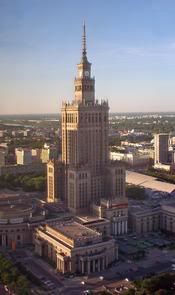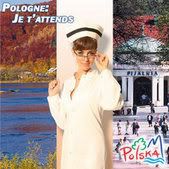Poland's new fascination with Jews
The Boston Globe:
IN A 1973 ESSAY, Cynthia Ozick speculated on how Jews would be remembered if, like every other nation of antiquity, they had vanished long ago. As people speak today of ''the glory that was Greece,' she mused, the achievements of the long-gone Jews would be celebrated as ''the genius that was Israel.'
''How -- if there were no Jews -- the world would be enraptured!' she wrote. ''The people that stood at Sinai to receive a desert vision of purity, the people of scholarly shepherds, humane prophetic geniuses, dreams of justice and mercy' -- how admired they would be. In a world without Jews, the memory of Jewish civilization would be endlessly fascinating. ''Christian ladies,' Ozick imagined, would ''study 'The Priceless Culture of the Jews' at Chautauqua in the summertime' or create Jewish prayer shawls at ''a workshop on tallith making.'
Well, Jews haven't vanished from the world. They have, however, all but vanished from Poland. More than 90 percent of Poland's Jews were murdered during the Holocaust, and most of those who survived emigrated long ago. The result is that a land that once was home to 3 million Jews -- 10 percent of Polish society, the largest Jewish population in Europe -- is now more than 99.9 percent non-Jewish. Millions of Poles have never knowingly met a Jew. But, oh, how enraptured they are with the genius that was Israel!
I arrived in Krakow near the end of the annual Jewish Culture Festival, a nine-day extravaganza of concerts, lectures, films, and exhibitions -- all with the aim, to quote a festival brochure, of ''presenting Jewish culture in all its abundance.' An elegant catalog, 160 pages long, lists a dizzying array of offerings: lectures on ''Talmudic thought' and ''Jewish medical ethics,' forums on European anti-Semitism and the Hebrew poetry of Haim Nahman Bialik, concerts of klezmer music, liturgical music, and ''Songs of the Ghettos and Jewish Resistance," workshops on Jewish cooking, Hasidic wedding dances, and celebrating Hanukkah with children.
Such a cornucopia would be impressive in Los Angeles or New York. In Krakow, with just 200 Jews in a metropolitan population of 1.5 million, it is astounding. More or less as Ozick imagined in 1973, Jews and Jewish culture are being embraced far more ardently in their absence than was ever the case when they were such a visible presence.
I caught part of the festival's closing concert, a kind of Jewish Woodstock that grows bigger every year. In the heart of what used to be Krakow's Jewish quarter, before an outdoor stage dominated by a giant electric menorah, 10,000 exuberant Poles swayed, cheered, and sang along as dozens of Jewish artists performed. The concert lasted for seven hours and was broadcast live on TV. In a country with no more than a wisp of Jewish life, where does such an appetite for things Jewish come from?
For some Poles, interest in Jewish culture is simply fun, or a fad; several in the crowd told me they had come because the concert is such a popular scene. But others, like 26-year-old Ola, who attended with her two young daughters, were drawn by an inchoate attraction they couldn't explain.
''I can't imagine Krakow without Jewish culture," she told me. But when I gently pressed her to say what ''Jewish culture" means -- how, for example, would she explain it to her daughters? -- she replied, vaguely, ''It's more about feeling than knowing. 'Jewish' to me means a warm feeling."
Then there are people like Tomasz Sierkierski, a 30-year-old computer programmer who was one of a dozen Poles honored during the festival for preserving Jewish landmarks. Searching for a way to reclaim some of Poland's lost Jewish heritage, he discovered a forgotten Jewish cemetery in Skarszewy, a small town not far from Gdansk. ''It was really destroyed," he said, ''full of trash and weeds." He recruited a group of teens from his old high school, and they spent the summer of 2004 carrying away the rubbish, cleaning and righting the fallen gravestones, and building a stone border.
Why do Poles like Sierkierski -- and there are many -- go to so much trouble? Of all the causes to care about, why worry about Jewish memory?
''Because," he told me, ''it is Polish memory too." He knows that nothing will bring back the rich Jewish culture that was so much a part of Polish life. But he wants at least to keep it from being forgotten.
When he first came to Skarszewy, he couldn't locate the cemetery. No one knew anything about it. Eventually an elderly woman pointed him in the right direction, and he found the neglected graves.
''Before this project," Sierkierski said, ''no one even knew a Jewish cemetery existed. Now the whole town knows." That, the look on his face makes clear, made the whole thing worthwhile.














0 Comments:
Post a Comment
< Main